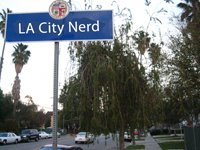 Travel back in time with me to 10 years ago when the City was just starting out "online." Have you seen the original webpage? Here's a screen shot of the original homepage in 1996. One page can still be accessed here. What a long way we've come.
Travel back in time with me to 10 years ago when the City was just starting out "online." Have you seen the original webpage? Here's a screen shot of the original homepage in 1996. One page can still be accessed here. What a long way we've come.In 1996, here's how the City promoted itself online:
About
LOS ANGELES
Lifestyles. The Los Angeles region has the richest diversity of food, clothing, architecture, entertainment, languages, world views and religions available anywhere in the world.
Out of Doors. We can swim the Pacific, ski in Big Bear or visit the desert all in the same day. Our average temperature is 74 degrees.
Small Business. Over the past decade, the number of Latino- and Asian-owned businesses has more than tripled. Over the past two ecades, Latino-owned firms have experienced a 700 percent increase.
Arts and entertainment capital of the world. We are home to the world's largest entertainment industry, and we have more community and ethnic festivals than anywhere in the country.
NLAMP. The New Los Angeles Marketing Partnership is the first united and comprehensive public information campaign designed to promote the positive facts about the LA region.
Growing. Local economists predict that Los Angeles County will add 53,500 new jobs in 1995. Many of these jobs will be in entertainment and professional management services.
Educated work force. Los Angeles has the largest concentration of college graduates anywhere in the country. In fact, since 1970 the county increased its number of college graduates from 500,000 to 1.2 million.
Link to the Pacific Rim and international trade. We are home to the largest port complex in the country, and we are the nation's largest trade center.
Economic powerhouse. We are the 15th largest economy on earth and have more software jobs than Silicon Valley.
Sightseeing. 22.2 million tourists visited in 1994, the highest number since 1991.
____
So, things have changed slightly in our perspective over the last 10 years, too. (What ever happened to NLAMP?)
What was this perspective and approach? Here's why the site existed (from the CityLINK page of 1996):
LA CityLINK
We have dual access by:
Bulletin Board (BBS). BBS provides information at the lowest cost. Citizens with any PC or MacIntosh Computer, any modem and any asynchronous communication program can dial-in to (213) 237-0974 and obtain free service.
World Wide Web (WWW). WWW offers an easier, higher function alternative. Citizens with Internet access and a Windows capable PC or MacIntosh Computer can find the City's home pages at http://www.ci.la.ca.us and obtain the same free services.
Our goal is to reach three audiences:
Our local citizens and businesses
Regional, state and international governments
Tourists and businesses external to the Southern California region that are interested in visiting or locating here.
We intend to actively work with Los Angeles regional agencies and business that are interested in similar goals and encourage you to contact us. Your response will be directed to the appropriate person at the City.
We believe in a region as large and diverse as Los Angeles that an electronic City Hall is an effective way to reach our community. In fact, we believe that through aggressive coordination with providing agencies, we can foster a sense of community between our diverse citizens and the many governments in the Los Angeles region. At present it is far too difficult and costly to find out about service from local government let alone receive it.
The mayor and City Council of Los Angeles want to change that. They have encouraged and supported the LA CityLINK project.
Watch our home pages and BBS evolve as we add more information. Help us with your comments. Here's to a more livable, friendly and responsive LA!
____
So, we've come a long way with the City's e-communications. Have we come far enough?


3 comments:
Hey remember BBS systems?
I have a friend who was probably one of the first people who met his wife online: he ran his own BBS and she was a user. They were married in 1991.
Thanks LA City Nerd!
Your posting brought back some (at times pleasant?) memories.
Respectfully Yours in Safety and Service,
Brian Humphrey
Firefighter/Specialist
Public Service Officer
Los Angeles Fire Department
Er, Brian... I'm curious, what's the difference between a Public Service Officer (PSO) and a Public Information Officer (PIO)?
Post a Comment